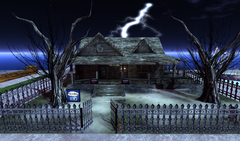100th Anniversary of Claude Debussy's Death
Thursday, March 22, 2018

The following post is by Ulrike Schädel, our intern for winter 2018:
This Sunday, 25 March 2018, marks the 100th anniversary of Claude Debussy’s death. He was born in a little French village in 1862 and died at the age of 56 in 1918 in Paris. The RISM database reveals Debussy’s innermost dark side during his final years. In this case Debussy’s opera La chute de la maison Usher gives an indication of this, as seen in six sketches of an autograph score kept in the British Library in London.
Edgar Allen Poe’s tale “The Fall of the House of Usher” had inspired Debussy in 1890, in the middle years of his life. This was due to the French translation by Baudelaire. Handwritten documents show that Debussy reflected on the fine line between life and death, insanity and the mysteries of the brain.
Originally, Debussy intended to compose a symphony based on Poe’s short story: Roderick Usher, the last male descendant of a formerly prosperous family, lives together with his twin sister Madeline and her sinister doctor in a manorial and ramshackle country house in the isolated English countryside. The relationship among the triangle is burdened by incest and unfulfilled desire. Madeline suffers from a disease that makes her waste away. Through a tragic mistake, she is buried alive in the family tomb. During a nocturnal thunderstorm, she appears to Roderick to take him to his death.
In 1908, ten years before his death, Debussy decided to pick up his work on this again. This time, he rearranged it as an opera. Although he generally avoided the atmosphere of theatres, he signed a contract with the Metropolitan Opera (New York City) to ensure the performance rights of the world premiere. In a letter to his friend Jacques Durand, Debussy wrote that he was working so intensely on The Fall of the House of Usher that he would sometimes lose his sense of reality and expected Madeleine to step through the door.
Debussy struggled hard with his late work. He was finally satisfied with his libretto after the third try. Debussy thought that he was suffering from neurasthenia. But in fact, he had fallen ill with colon cancer. More and more, he identified himself with the character of Roderick Usher, especially his mental collapse when the house of Usher also collapses. Debussy worked on this opera until shortly before his death. In 1915 he recognized that it would be unlikely for him to complete his work and he wrote of his pain and deep despair. In 1916 and 1917 he managed to compose the music of Act I and two scenes from Act II. Some further ideas are found in sketches. He left it in this stage until his death in 1918. Debussy’s opera The Fall of the House of Usher remained unfinished.
Emma Claude Debussy, his widow, gave the sketches away. One indication of this can be seen on the source itself: “La chute de la Maison Usher. pour Marcelle Meyer | avec tout mes sincère | affections ECD.” Almost 60 years later, in 1976, Juan Allende-Blin, a Chilean composer, undertook systematic research of all of the sketches, which were scattered around the world, and brought the documents together again. He then orchestrated a playable version out of the existing material while retaining the unfinished gaps. The first performance of Debussy’s La chute de la maison Usher took place in a concert performance in Berlin in 1977 and in a semi-staged version in 1979.
References: Kabisch, Thomas. “Debussy, Claude.” In Die Musik in Geschichte und Gegenwart. Allgemeine Enzyklopädie der Musik. Edited by Ludwig Fischer. 2nd ed. Personenteil, vol. 5., cols. 566-640. Kassel and Stuttgart: Bärenreiter, 2001.
Orledge, Robert. “Debussy’s House of Usher Revisited.” The Musical Quarterly 65, no. 4 (1976): 536-553.
Image: “The House of Usher” by Ciaran Laval, from Flickr (CC BY-NC-SA 2.0).
Share Tweet EmailCategory: Musical anniversaries

